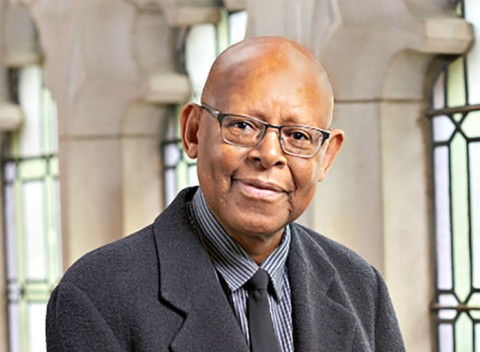Black liberation theologian James Cone wins 2018 Grawemeyer Award in religion
The award honors his book The Cross and the Lynching Tree, which shows how white supremacy has affected dominant views in the church.

James Cone, one of the most powerful voices shaping black liberation theology, won the 2018 Grawemeyer Award in Religion for his book The Cross and the Lynching Tree.
In that work Cone, professor of systematic theology at Union Theological Seminary in New York City, draws on the history of the public murders of African Americans from the post-Reconstruction era through the civil rights era.
“The crucifixion was clearly a first-century lynching,” Cone said in a statement. “Both are symbols of the death of the innocent, mob hysteria, humiliation, and terror. They both also reveal a thirst for life that refuses to let the worst determine our final meaning and demonstrate that God can transform ugliness into beauty, into God’s liberating presence.”
The Grawemeyer Award, honoring “creative and significant insights into the relationship between human beings and the Divine,” is given annually by the Louisville Presbyterian Theological Seminary and the University of Louisville. The prize is one of five given in different fields and includes $100,000.
Cone, an ordained minister in the African Methodist Episcopal Church, is also author of Black Theology and Black Power (1969), A Black Theology of Liberation (1970), and the highly acclaimed God of the Oppressed (1975).
Stephen G. Ray Jr., executive director of the Society for the Study of Black Religion, wrote in his Christian Century review of The Cross and the Lynching Tree that “Cone invites us to revisit and rethink the theology of the cross so it does not require an act of historical amnesia that denudes the cross of its redemptive power.”
Ray’s sense is that Cone’s work has been an effort to address two problems: how to “bear witness to the power of life in the midst of a world awash in violence” and how to lift up the resurrection without being oblivious to suffering.
Cone demonstrates how white supremacy was part of Christian identity for the churchgoers who participated in lynchings and how it continues to shape dominant views today, Ray wrote. “What distinguishes this book and makes it a fitting capstone to his career is the way that he uses the creativity of African-American theological and cultural sources to transform a central category of the Christian faith so that it resists the co-option of the faith by the forces of lethal iniquity.”
A version of this article, which was edited on December 20, appears in the January 3 print edition under the title “People: James Cone.”




